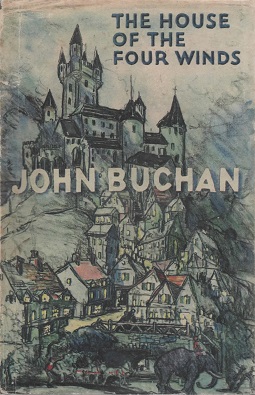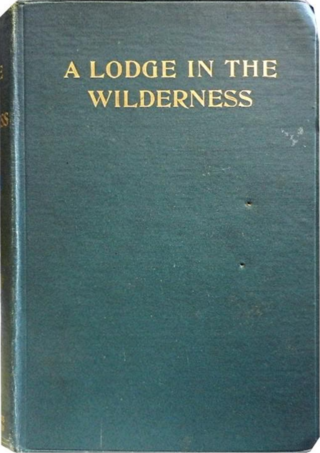
John Buchan, 1st Baron Tweedsmuir was a Scottish novelist, historian, and Unionist politician who served as Governor General of Canada, the 15th since Canadian Confederation.

Witch Wood is a 1927 novel by the Scottish author John Buchan that critics have called his masterpiece. The book is set in the Scottish Borders during the Wars of the Three Kingdoms, and combines the author's interests in landscape, 17th century Calvinism, and the fate of Scotland. A significant portion of the dialogue is in Scots.

The Courts of the Morning is a 1929 adventure novel by John Buchan, featuring his character Sandy Arbuthnot. The prologue is narrated by Richard Hannay, so the novel is sometimes included in Buchan's Hannay series. The action is set in Olifa, a fictional country on the west coast of South America.

Salute to Adventurers is a 1915 historical adventure novel by the Scottish author John Buchan. Largely set among the newly-settled Virginia plantations of the late 17th century, the novel includes a number of historical characters and events, including the wild and radical preaching of John Gibb, founder of the Sweet Singers sect.

Castle Gay is a 1930 novel by the Scottish author John Buchan. It is the second of his three Dickson McCunn novels and is set in the Scottish district of Carrick, Galloway some six years after the events described in Huntingtower.

The House of the Four Winds is a 1935 adventure novel by the Scots author John Buchan. It is a Ruritanian romance, and the last of his three Dickson McCunn books. The novel is set in the fictional Central European country of Evallonia and opens two years after the events recounted in Castle Gay.

The Gap in the Curtain is a 1932 borderline science fiction novel by the Scottish author John Buchan. Part of the action is autobiographical, featuring the agonies of a contemporary up-and-coming politician. It explores the theory of serial time put forward by J W Dunne: Buchan had been reading An Experiment with Time.

Huntingtower is a 1922 novel by the Scottish author John Buchan, initially serialised in Popular Magazine between August and September 1921. It is the first of his three Dickson McCunn books, the action taking place in the district of Carrick in Galloway, Scotland.
William James de L'Aigle Buchan, 3rd Baron Tweedsmuir, also known as "William Tweedsmuir" was an English peer and author of novels, short stories, memoirs and verse. He was the second son of the writer and Governor General of Canada, John Buchan.
David John Daniell was an English literary scholar who became Professor of English at University College London. He was founder of the Tyndale Society, a specialist in William Tyndale and his translations of the Bible, and author of a number of studies of the plays of Shakespeare.

Midwinter: Certain travellers in old England is a 1923 historical novel by the Scottish author John Buchan. It is set during the Jacobite rising of 1745, when an army of Scottish highlanders seeking to place Charles Stuart onto the English throne advanced into England as far South as Derby. The Prince, otherwise known as "Bonnie Prince Charlie", the grandson of the ousted King James II, required men and money from English Jacobite sympathisers, and the novel imagines why those were not forthcoming from landowners in the Western counties and Wales. It purports to sheds light on Samuel Johnson's previously unknown activities during that period.

The Half-Hearted is a 1900 novel of romance and adventure by the Scottish author John Buchan. It was Buchan's first novel in a modern setting and was written when he was 24 while working for an All-Souls fellowship and reading for the bar.

Sir Quixote of the Moors: being some account of an episode in the life of the Sieur de Rohaine is an 1895 short novel by the Scottish author John Buchan. It was Buchan's first novel, written when he was nineteen and an undergraduate at Glasgow University. Buchan's original title was Sir Quixote, and he was annoyed by the addition of "of the Moors" by his publisher.

John Burnet of Barns is an 1898 novel by the Scottish author John Buchan, published when he was 23 years of age. His second novel, it had first appeared in serial form in Chambers’s Journal earlier that year.

A Lost Lady of Old Years is an 1899 novel by the Scottish author John Buchan. It was first published in serial form in Today. The title comes from Browning’s poem Waring.

A Lodge in the Wilderness is a 1906 political quasi-novel by the Scottish author John Buchan.

The Blanket of the Dark is a 1931 historical novel by the Scottish author John Buchan. The novel is set in the early part of the reign of Henry VIII, and explores the possible consequences had the Tudors been overthrown by a rightful descendant of Edward III.

The Free Fishers is a 1934 novel by the Scottish author John Buchan, his last work of historical fiction. The novel is set during the period of the Naploeonic wars and follows the adventures of Anthony Lammas, a young professor at St Andrews, who is drawn into a plot to kill the prime minister. He is aided by The Free Fishers, a secret mutual aid organisation.

Montrose is a 1928 biography of James Graham, 1st Marquess of Montrose by the Scottish author John Buchan.

















